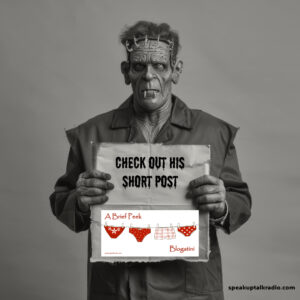I Am Dr. Frankenstein: How Writing a Novel Makes You a Mad Scientist by Alex Hugie

I’m amazed by the absolute miracle that is written language. Over centuries and millennia, we humans have figured out how to create strokes of ink or carved stone which, brought together in a certain way, create meaning. One might even say we give them life.
At the risk of sounding overly dramatic, I submit that the art of wordsmithing isn’t so different from the gruesome work performed by Mary Shelley’s iconic character, Dr. Victor Frankenstein. The doctor pieced together body parts and organs to form a wholly new creature, a creature which—contrary to popular depictions in film and television—was not a stupid, grunting monster, but an articulate, intelligent being. Crap happens, and things get out of hand, and people die, but that’s beside the point.
As a kid, I used to think that authors were struck by inspiration that was complete, perfect, and guaranteed to fit together. But the truth is that good ideas don’t often come cleanly. Instead, authors find themselves constantly swapping out bad pieces for better ones, rearranging and rewriting, and sometimes even discarding large chunks that turned out not to serve the function they had hoped.
Writers face the daunting task of making their work function well not just as individual pieces but as a harmonious whole that equals more than the sum of its parts. That means you make sure to keep the promises you made to your reader by the end of the story. It means you have faith that laboring over the minutia of unrealistic character emotions, rough descriptions, and tiny plot holes, and every inconsistency your critiquers identify will pay off in the end. It means being patient with yourself and your writing and not suturing together a substandard story that will wander the earth, an incoherent creature that never truly comes to life.
But at the same time, you can’t withhold those volts forever. You must accept imperfection in your creations or else risk never finishing anything at all. What matters is knowing that you made what you wanted to make the best you could. Then, even when some may call you mad and reject your monster, others will look into the monster’s eyes and see themselves. And soon enough the monster will be clamoring for you to create a companion, and you will take what you learned from the first attempt and do it again, but even better.
As I continue my writing journey, I’ve found it replete with messy emotions—inspired, discouraged, energized, indifferent, impassioned, dispassionate. It’s a rollercoaster that I may sometimes question boarding, but one that is also endlessly rewarding. And it’s an ongoing struggle to balance exercising my creative juices with all the important responsibilities of life. But in pursuing the mad science of storytelling, the successes and failures, the trials and triumphs, I take to heart the words of the late Robin Williams:
“You’re only given a little spark of madness. You mustn’t lose it.”
